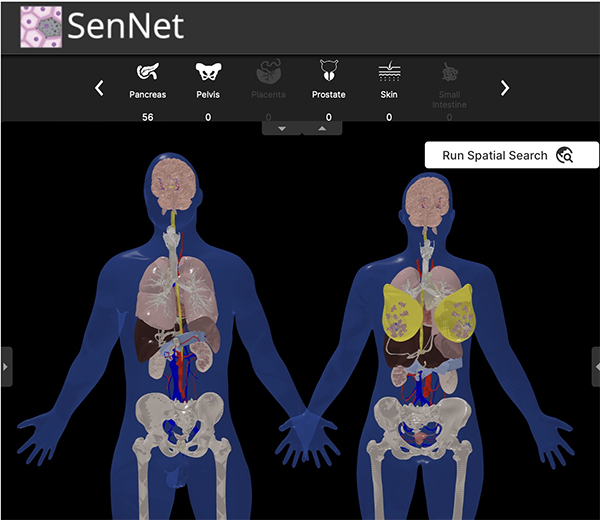
Jonathan Silverstein, professor and chief research informatics officer, and Kay Métis, Executive Director Programs and Strategic Initiatives, in the Network Operations Center (NOC) with the systems that Dell awarded to the University. (Tom Altany/University of Pittsburgh)
The University of Pittsburgh’s recent, significant expansion of its high-performance computing capabilities, courtesy of a gift from Dell Technologies, indicates a strategic commitment to using large-scale data analysis for faster translational research. The additional 9.672 gigaFLOPS of computational power – translating to nearly 9.7 trillion additional computations per second – could help Pitt’s Innovation Hub for Health Science Medical Research attract research funding in areas such as precision medicine, drug discovery, and disease modeling. Interest in high-performance computing in drug discovery has ramped up in recent years.
“These large collaborative projects, which involve hundreds of investigators, utilize a unique computational architecture we’ve installed on the Dell system,” said Jonathan C. Silverstein, MD, professor and chief research informatics officer at the University of Pittsburgh. The new system will enable secure, large-scale processing of image, genomic, and proteomic data to generate cellular and molecular maps for research.
Pitt’s high-performance computing initiative could accelerate discovery
The infrastructure will serve as a cornerstone of Pitt’s strategy to tap its research capabilities, extending its impact beyond greater Pittsburgh. “These large systems enable large numbers of investigators to rally around them and solve larger problems than can be solved by individual investigator laboratories,” Silverstein said. “This opens the impact of these systems to many more human lives.”
This computational boost aligns with Pitt’s R&D track record. The university ranks among the top 2% of American universities and places fifth in grants from the Department of Health and Human Services.
Disease insights through data

Computer interface capture with “blue” people: NIH Cellular Senescence Network (SenNet) anatomic atlas exploration user interface. (University of Pittsburgh)
In particular, the Dell-powered systems will support ongoing initiatives such as the Breast Cancer Research Foundation Global Data Hub and the NIH Cellular Senescence Network, which explore complex disease mechanisms to identify novel therapeutic targets. “These projects are focused on analyzing metastatic breast cancer and aging biology datasets,” Silverstein explained. He noted that the data have “the potential to unlock breakthroughs such as response patterns to treatment, and underlying biological mechanisms at the cellular and molecular level of cancer metastasis and both healthy aging control and disease prevention mechanisms.” The success of such projects could lead to the development of new drugs, diagnostic tools, and personalized treatment strategies, all with significant commercial potential.
The power of algorithms trained on big healthcare data
“The core analytics planned include algorithms that classify genomic, proteomic and imaging morphology to determine cell types, functional tissue units, and vascular patterns in the tissue,” Silverstein added. Competitions on Kaggle, a popular data science platform, have recently focused on similar tasks.
Translating knowledge Into clinical practice
According to Silverstein, these cellular and molecular maps will provide a comparative basis for studying various disease conditions. “As our knowledge grows in these areas, disease-specific maps can be used to compare differences, suggesting areas to focus on for a deeper understanding of disease mechanisms,” he said. “When this is done, clinical tests for these specific differences using similar techniques are the promise of this work.”
Pitt’s high-performance computing initiative and cross-institutional collaboration
The Dell system will also enhance collaboration among the University of Pittsburgh, UPMC, Pittsburgh Supercomputing Center, and Carnegie Mellon University. “The informatics and biology investigators, as well as the information technology from the University of Pittsburgh, are coupled with the clinical data and clinician expertise of UPMC in one medical center,” Silverstein explained. “These existing collaborations in breast cancer and cellular senescence already benefit from the high-performance computing and scalable algorithms expertise at Pittsburgh Supercomputing Center and Carnegie Mellon University. This infrastructure will enable those collaborations to extend more deeply and broadly.”
As Pitt continues to strengthen its position as a leader in data-driven health research, the university’s enhanced high-performance computing capabilities will likely serve as a catalyst for increased industry engagement, technology transfer, and economic growth in the Pittsburgh region and beyond.
Filed Under: machine learning and AI, Omics/sequencing, Oncology



